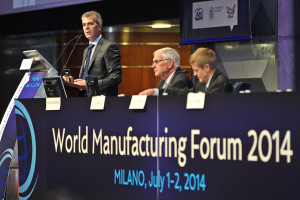
With 450 participants in two days, the third edition of the World Manufacturing Forum, in Milan, is deemed a success, due to its organization and the positive feeling that has permeated speeches and opinions by the attending managers. Manufacturing sloughs its skin and starts growing again. «If there was an instrument to measure the level of confidence and optimism, well, undoubtedly its indexes during the World Manufacturing Forum 2014 would have been very high». With this joke, the scientific chairman of WMF Marco Taisch, professor at Milan Polytechnics, commented the positive trend of the last edition of the event, held at Piazza Affari. Especially in the second Milanese day of the World Manufacturing Forum 2014, the focus was on robotics as fuel for the European upswing of industry and of small-medium enterprises, according to a strategy of collaboration and support to the labour force, instead of possible antitheses. The theory is that robots can give something more to the EU manufacturing industry in terms of execution speed and precision – therefore of competitiveness – freeing human hands from dangerous tasks. Certainly, it will be necessary to create the conditions enabling workers to develop adequate competences to make them suitable for higher added value tasks, but currently the certainty is the coexistence with a stricter and stricter contact is possible, even in the arena of small & medium businesses. This is the idea advocated by the CEO of Universal Robots, Enrico Krog Iversen. The experience taught him that personal names are assigned to humanoids in companies, due to the great familiarity reached with colleagues in flesh. Besides, they are artificial intelligences of easy programming, re-programming and installation that in 80% of cases are devised to carry out different operations from those of industrial robots and specific instead of small companies. Provided that a preliminary risk analysis is necessary, they find space in workshops, in environments where the separation barriers from men have been eliminated and, waiting for the definition of the new TS standard for robotics, they have a great future in front of them. This year, in Europe, around 40,000 robots in all are expected to be sold in Europe and 100,000 in the world in 2016. According to the estimates by Iversen, SME constitute 97% of the productive activities in the world and their boost to automation is, and it will compulsorily be, growing. As perfectly knows also the technological manager of Kuka Bernd Liepert, believing that the robotic market can be driven by instances of growing importance, like ergonomics and safety. He also believes that the investment in automated systems can be a crucial driver in the manufacturing re-localization in Western nations. Mixed teams of humans and robots collaborate in the implementation of different parts of hulls in that automotive area in which the ultra-light Kuka Lbr model has already contributed in the production of 500,000 gearbox levers. Sensors and software controls are details of primary importance on which to work, but the industry’s commitment is not missing. Concerning this, Liepert reminded the efforts of the no-profit association Eu-Robotics, public-private partnership that counts a good 180 members. The CEO of Comau Italia Riccardo Tarantini counts 20 million small and medium producers on the European soil who wish to make their processes more efficient, at the same time coming to terms with meagre capitals. The Piedmontese manufacturer works to grant the experience gained in the corporate segment to SME, assuring sustainable investments and operating to simplify the programming procedures. Involved in international initiatives like Hephestos or Flexicast among the others, Comau proposes a new generation of robots with easy set-up and low management cost, able to handle objects weighing from five to 800 kilos. Besides, it grants useful flexible technologies both for the almost-craft requirements of the footwear industry and for the die-casting and photovoltaic needs.



